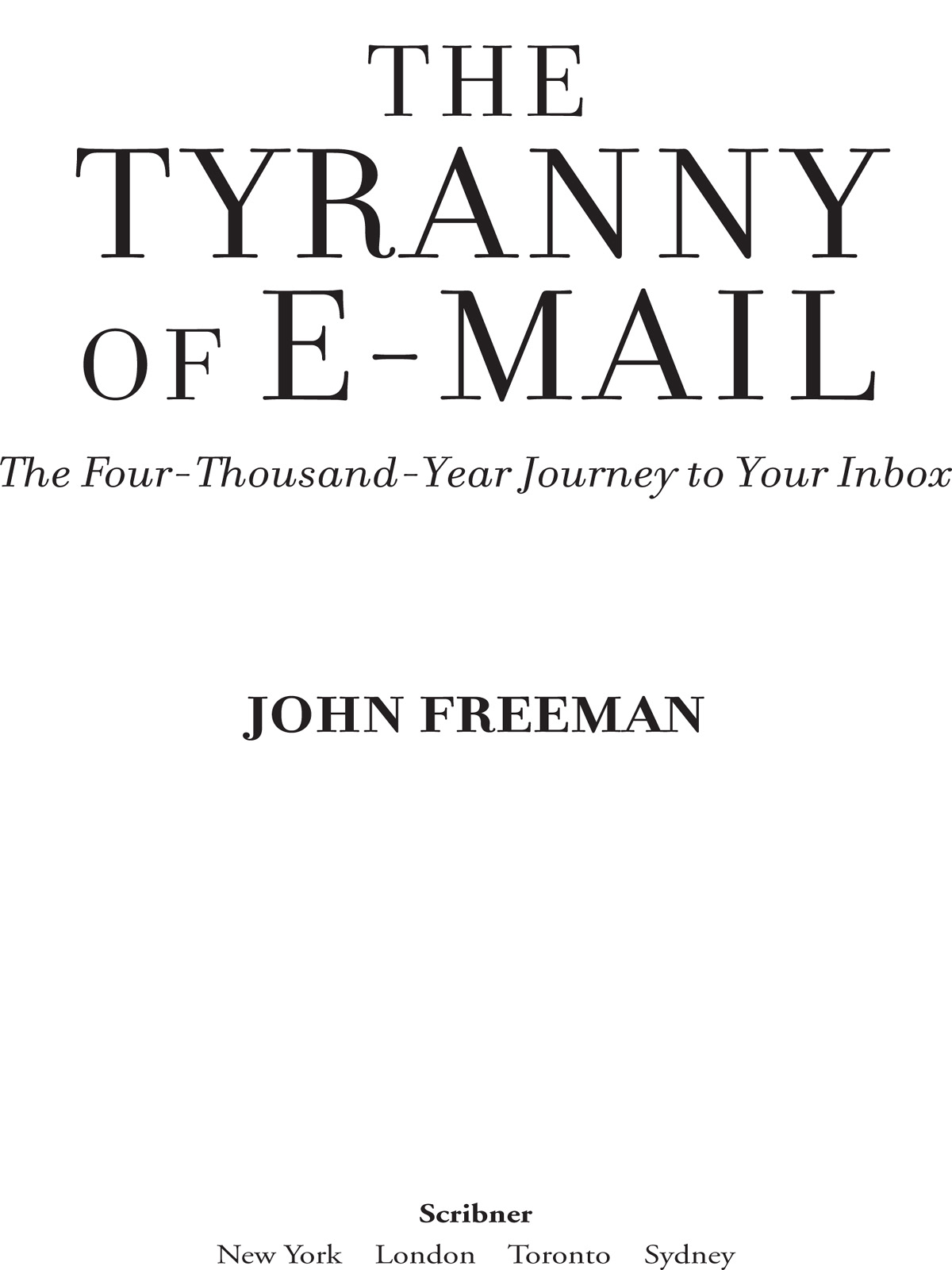
The Tyranny of E-mail
The Four-Thousand-Year Journey to Your Inbox
کتاب های مرتبط
- اطلاعات
- نقد و بررسی
- دیدگاه کاربران
نقد و بررسی

August 24, 2009
We've all experienced the “tyranny of e–mail”: the endless onslaught, the continual distraction, the superfluous messages clogging our inboxes. Freeman, acting editor of Granta
magazine, captures viscerally “the buzzing, humming megalopolis” that “tunes into this techno-rave of send and receive, send and receive.” And he draws effectively on psychological and social research to describe the harm this “tsunami” of e-mail is causing: fragmenting our days, fracturing our concentration, diverting us from other sources of information and face-to-face encounters. Freeman is best when he is on point. But when he drifts into history—granted, to make the salient point that this feeling of life speeding out of control overwhelmed people with the arrival of the railroad and the telegraph (though, strangely, he omits the telephone, our e-mail enabler)—he offers more postal and telegraphic details than most people will want and hammers his main points into the ground (e.g., we need to be needed, and receiving e-mail gratifies that need). But his closing “manifesto for a slow communication movement” could fuel an e-mail rebellion, and his tips on how to slow down are sensible and mostly doable, except perhaps for the most hard-core e-mail addicts.

September 15, 2009
A cool yet unreserved manifesto against the drug-like, numbing consequences of e-mail correspondence and the alienating paradox at the heart of our so-called"connected" online lives.
It's when e-mail overshadows those who use it, writes literary critic and Granta American editor Freeman, that we're in genuine trouble of surrendering our relationships, acumen, physical and mental health, creativity and time, all for the sake of convenience. The author is no Luddite, however, nor is the book a regressive polemic. Correspondence has always pursued expediency, writes Freeman, and he readily acknowledges the digital media's manifold benefits over previous modes. But as he repeatedly points out, e-mail is only the latest iteration of this logical progression from primarily geocentric (and agonizingly slow-to-arrive) pre–post office correspondence to the telegram to the first e-mail ever sent—on Oct. 29, 1969, over the pre-Internet ARPANET. We built these roads toward nonlocal communication, Freeman argues, but we now need to choose when and how fast to walk them, because speed"is not a neutral deity." Nor is e-mail's ubiquity neutral. No downtime and increasingly fewer chances to unplug both give rise to isolation, addictive behavior and a host of other negative psychological problems including sleep deprivation and degraded focus and memory function. Freeman cites numerous studies and quotes everyone from Bill McKibben to Susan Sontag in support of his central thesis that our hyperconnected lives are in reality anything but. The author's ten-part program to break what he considers a dangerous addiction to e-mail is predicated on a simple, potentially divisive premise: Don't send one. Freeman is a matchless writer with a talent for such bombshells, and his conclusions are rational, practical and wholly refreshing.
First steps toward a Slow Communication movement?
(COPYRIGHT (2009) KIRKUS REVIEWS/NIELSEN BUSINESS MEDIA, INC. ALL RIGHTS RESERVED.)

October 1, 2009
Freeman, literary book critic, former president of the National Book Critics Circle, and now the new American editor of "Granta" magazine, examines email communication technologies and behaviors from the vantage point of the history of correspondence. Treating email as a highly disruptive technology in our personal, social, and work lives, he reviews the effects handwritten mail, typewriters, postcards, and telegrams have had on our civilization. With that foundation laid, email is angrily attacked from every conceivable perspective. There are many insights, such as how email changes how we communicate, what we communicate, our sense of space and time, and who communicates to whom; however, many topicse.g., the ramifications of unlimited email storage, email monitoring by employers, and correspondence that will be lost to historyare covered too thinly. Freeman's go-slow argument wanders considerably to throw punches at all kinds of online behaviors and technologies including sexting and egosurfing. VERDICT Luddites will gleefully race through this book in a few hours while others will have trouble following the argument and will skimironically, this is the very reading behavior Freeman abhors. [See Prepub Alert, "LJ" 4/1/09.]James A. Buczynski, Seneca Coll. of Applied Arts & Tech., Toronto
Copyright 2009 Library Journal, LLC Used with permission.

























دیدگاه کاربران